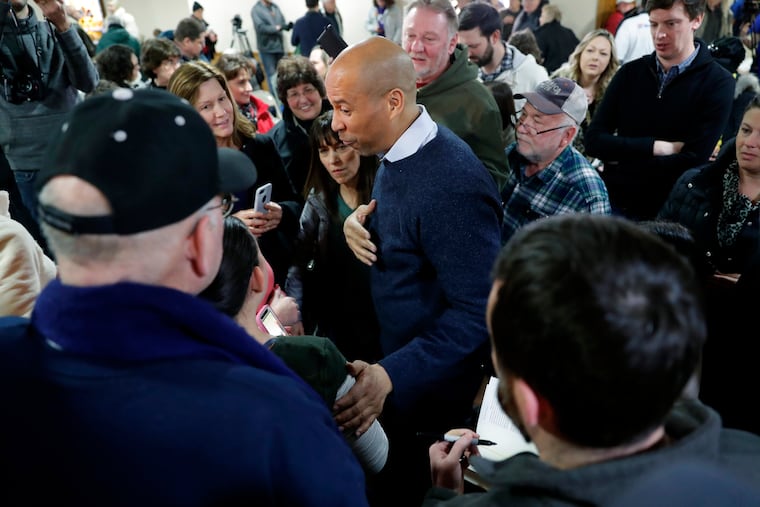From an Iowa kitchen, the crazy but kind of reassuring path toward the presidency | Analysis
Standing in someone's living room, there was no Super PAC or TV ad that could help Cory Booker - he was face-to-face with dozens of ordinary Iowa voters, and the only person who could make his case was him.

IOWA CITY, Iowa — It was around 9 p.m. and freezing, as we trooped over a solid-ice sidewalk and into a stranger’s house, when I really started understanding how campaigning in Iowa works.
I walked in with a handful of other reporters, past a pile of shoes by the door, and was shunted into the kitchen, the only area that had any space left.
I had no idea whose home it was, but, standing by a tray of cookies, I was left looking at their children’s artwork on the walls and pizza coupons on the fridge, while one room over, a U.S. senator, Cory Booker, made the case for why he should become the most powerful person on Earth.
It felt crazy that this was part of the process of choosing a president, but also reassuring.
There was no campaign money or super PAC or TV ad that could help Booker here. The New Jersey Democrat was face to face with dozens of ordinary voters, and the only person who could make his case was he.
This is normal, Janelle Rettig told me.
A one-time field staffer for Bob Dole who came to Iowa in 1988 and never left, she said she had personally met every president since Ronald Reagan, except Donald Trump. These gatherings, she said, were a chance to ask candidates about policy, but also to measure their personalities. How do they interact with a crowd? How do they treat people?
Before the Iowa caucuses next January, she said, Booker will probably have to vacuum someone’s floor to show he’s the real deal.
“We take our time. We interview them,” said Rettig, 53, a county supervisor in Johnson County who has been a Democrat for two decades. “It’s fun to be an Iowan.”
There are plenty of people, of course, who grate at the Hawkeye State’s outsize role in deciding presidential nominations. The state is largely rural and 91 percent white, hardly reflective of the broader country’s demographics or geographic variety. The weight of the caucus contests there means that some Iowa priorities, like support for corn-based ethanol, enjoy political protection whether or not the ideas are sensible national policy.
On the other hand, someone has to go first, and in about 48 hours in Iowa, I saw bald eagles flying overhead four times. If that doesn’t scream “America,” I’m not sure what does.
Booker’s campaign swing began early Friday in a church basement, then zipped to a community college and an African American museum, each event an hour-or-two drive from the last one. There were also private meetings and behind-the-scenes maneuvering by his aides (it’s still politics) before he arrived at a house in a quiet neighborhood with a suburban feel.
In the living room were a handful of local politicians — one mayor wore the kind of gold name tag you’d normally associate with a hotel receptionist — but mostly everyday people who cared about government policies and took their vetting seriously. Several I met were getting degrees in health-care fields. One taller man punctuated Booker’s comments with his own exclamations.
They asked about the cost of prescription drugs, about public schools, college debt, and Medicare for All.
Booker had answers for each topic, as he did at every stop, but his overall pitch hinged more on restoring a sense of unity and positivity in America than any specific policy.
“This is much more than an election. This is about hope,” he said as his time ran down and his voice faded. “I am running for president to call us together so we can speak with a chorus of conviction.”
That was good, Rettig told me. But not enough.
“That’s a message we need. We can’t run on fear,” she said after Booker finished, as guests extracted shoes from the pile and walked carefully into the night.
But she also expected more.
“That was all great, but that’s not what I’m looking for,” she said. “I expect when he comes back, we’ll get more details.”
And if not?
“If people stick to the inspirational speech, they’re usually not a great candidate,” she said. “I don’t see the world in rose-colored glasses.”
She allowed, however, that Booker was introducing himself, trying to leave a good first impression before possibly delving deeper into policy.
After all, Iowans expect him to come back. Rettig figures that caucus-goers try to see each candidate four to five times. She’ll read their books. She’ll make a handwritten chart of where they stand on the key policies.
And take note of how readily they work that vacuum.